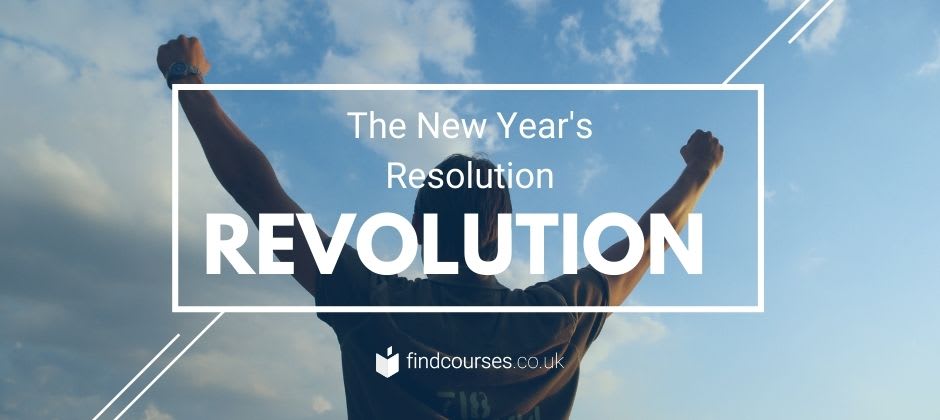Join our resolution revolution and make 2024 your best year yet.
We know that the end of the year is typically a time for resolutions, for giving up chocolate or for exercising more.
But we think that resolutions should be about reflection. About recognising the progress you've made in the previous year, and about setting meaningful goals for yourself for the year to come.
That's why we don't want to spend our time focusing on what we can't do, what we shouldn't do, and more time focusing on what we can do. What we want to do.

3 Steps to setting a resolution you can stick with:
Step One: Reflect
Have you ever been given feedback on a piece of work? Or sat down for a performance review? They rarely start by telling you all the things you should be doing.
No, they start by telling you what you've done. It's a recap of your work, a summary of your achievements and (hopefully) some ideas as to how you can improve.
So why don't we afford ourselves the same courtesy? Why, when we think about resolutions, do we immediately start looking forward, without taking the time to look back?
Think about the year just gone. Think about things you achieved, things you did that you were proud of, and what you might want to improve. Perhaps you didn't finish that online class you started and you'd like to go back to it. Perhaps you wanted to take up knitting, or write that novel and it didn't quite happen.
Make a word cloud of everything about the year. Feelings that you felt, overarching themes. Perhaps it was a year of tough work. Perhaps it was a year where you felt a bit lost. Be honest with yourself, and don't edit yourself as you jot notes down. There are no right or wrong answers, and no-one will be checking it. Just write down anything that comes to your mind.

Step Two: Recognition
Look at your word cloud, your jumble of thoughts and feelings about the year has gone by and pause for a moment.
Now, think of something you are proud of yourself for. Think of something you've done that you can give yourself a pat on the back for.
This doesn't have to be something monster - like winning a Nobel prize. Some years it could be something as small as 'I got up and out of bed on the days I didn't feel like it.' Other years it might be 'I won that award at work I've been coveting.' Or perhaps you finished a particularly long and arduous project? Perhaps you picked up a new hobby and didn't quit when it got difficult. Perhaps you learnt a new skill, or tried your hand at DIY?
Be kind to yourself and imagine you're speaking to a friend. Think of all the small things you would celebrate them for, and now turn that gaze inwards. It might be more uncomfortable doing it for yourself, but give it a go.
And write down at least one thing you've done this year that you are proud of - no matter how big or how small it might seem.

Find your next course
Step Three: Resolve
Now we've spent some time relfecting on the year, on how it felt, on what we did, on what we were proud of, now we can start to look forward. Now we can use that dreaded word: resolution. Except we're not going to use it in the typical way.
Think about where the word resolution comes from. It comes from resolve, meaning to make a decision formally, and with certainty.
Now I'll bet you a copper penny that you don't always view "resolutions" as something you should view as formal, committed decisions. Especially not when you find your hand reaching for the biscuit jar on January 5th...
And why might that be?
Well, because we try and set more than one resolution, most of the time. We give ourselves a vertiable list of all the ways we can be better humans in the coming year, without really stopping to think about which is the most important goal, which one we should really focus our efforts onto, and why.
So the penultimate step is for you to make a big list of what your resolution might be. Think of all the goals you have for yourself, all of them, and brain-dump them onto the page. Perhaps you want to find a new job, or re-train into a completely new career, or get that promotion you've been dancing around. Perhaps you want to go back to college, or finally apply for that degree, or learn how to make that complicated layer cake they had on Bake Off.
Write them all down.
And now, just choose one.
Of all your lists, select one of them.
Now I can hear your question. "But how do I choose one when there's ten in front of me? How am I meant to choose just one?"
Well, let's go back to the word cloud you wrote about the year just gone. I want you to close your eyes now and imagine that we're a year ahead, and you're sat there, reflecting on what's happened. I want you to think of all the words you'll use for the year, words like achievement and success and finally.
I want you to think about how that will feel and how proud of yourself you will be.
And now choose the goal that fits those words.
Choose your resolution - just one of them - and resolve yourself to sticking to it. To following your goal - to making it happen.
And if you'd like, tell us what your goal is in our biggest ever survey!
Find your next course


